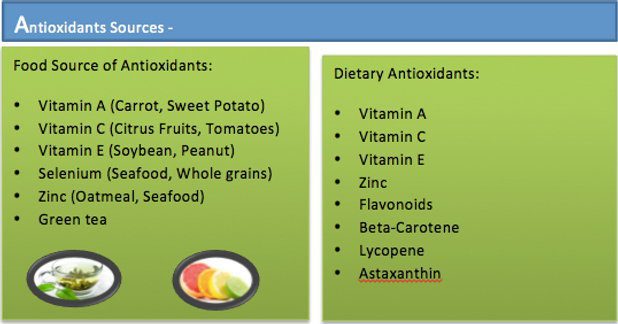
Sportsperson’s body consumes a vast amount of oxygen during different workouts. It uses oxygen to release energy from metabolic fuels, mainly glucose and fat, and power muscle activity. But oxygen has a downside.
As a very unstable molecule, it has a tendency to generate free radicals. As per studies, sportspersons involved in strength and endurance training tend to produce more free radicals than individuals.
Highly reactive in nature, Free radicals target your tissues, DNA and polyunsaturated fatty acids within your cell membranes. This leads to a chain reaction which ultimately results in cellular destruction.
As a result, they are responsible for aches, pain, fatigue, aging, prolonged recovery and for causing diseases like cancer, high blood pressure, immune system deficiencies, stroke and other degenerative diseases.
In addition to prevention of nutrient deficiency disorders, a group of vitamins, minerals, and enzymes called antioxidants have been identified that protect your body from such chemical damages.
Antioxidants are scavengers of free radicals. In simple terms, antioxidants protect your cells against free radicals, which cause damage and may play a role in diseases such as heart disease and cancer. When the free radicals outnumber the antioxidants, it leads to a state, which might cause such diseases.
There is a broad range of antioxidants found in nature, and various antioxidants provide benefits to different parts of the body. For example, Beta-carotene is highly beneficial for good vision and eye health. Lycopene is beneficial for helping in maintaining prostate health.
Flavonoids are good for a healthy heart and Astaxanthin followed by Beta-carotene combined with vitamin E has been shown to be one of the most powerful antioxidant combinations for helping protect the skin from reactive species of oxygen.
Apart from skin care, it is beneficial in boosting immunity as well. Please note that all these antioxidants should be taken under supervision only.

Antioxidants play a very important role during the survival of all living beings. Though the human body has the capability of developing its own antioxidants, however, dietary intake of antioxidants is important for optimal health depending upon your lifestyle and workout patterns.
At the same time, excessive intake of isolated antioxidants can have toxic effects. Therefore, you should avoid high-dose antioxidant supplementation and better take an expert nutritionist advice before taking any dosage.
If you have any questions related to diet consultation or weight loss, please schedule an online appointment with Dietitian Silky Mahajan.
For inquiries, please feel free to email us at info@foodsandnutrition.in or call us at 7829999400. 10:00 AM IST - 7:00 PM IST (Mon - Sat).
